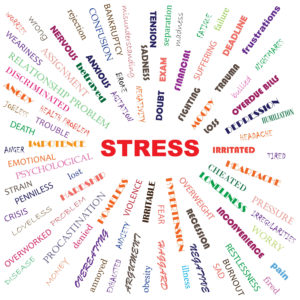Can Stress Cause Temporary Hair Loss, or Telogen Effluvium?

Overview
Does Stress Cause Hair Loss?
What Is Telogen Effluvium?
How to Know if Stress is Causing Your Hair Loss
Telogen Effluvium Treatment: How to Regain Hair Loss From Stress
Stress and Hair Loss FAQs
Does Stress Cause Hair Loss?
Stress is an unavoidable part of life. We all come across little things that may frustrate us from time to time… but every so often, serious stressors come around that really push us to our limits.
Large amounts of prolonged stress can have a major impact on the mind, the body… and even your hair. Stress has been linked to three types of hair loss: telogen effluvium, trichotillomania, and alopecia areata. Recent research from Harvard University has confirmed that long-term or chronic stress can impair hair follicle stem cells and cause hair loss.
Learn more about how stress causes hair loss, types of stress-related hair loss, how to restore hair lost from stress, and answers to other common questions.
What is Telogen Effluvium?
Did you know that some hair loss is a normal part of the hair growth cycle? Hairs grow for a few years, rest for a few months, shed, and regrow all the time. It’s perfectly natural to lose around 100 hairs a day as part of that shedding phase. However, if a highly stressful “shock to the system” occurs, many of the hairs on your scalp may be shed a few months after the triggering event. This sudden increase in hair loss is known as telogen effluvium.
Telogen effluvium occurs when stress causes hair roots to transition into the resting (or telogen) state prematurely, resulting in a large and abrupt amount of hair shedding. Telogen effluvium is a non-scarring, diffuse hair loss typically involving less than 50% of the scalp hair, occurring around three months after the triggering event. Telogen effluvium is a form of temporary hair loss, typically lasting around six months.
Telogen effluvium can be caused by not only stress but also drug use, fever, trauma, and other disorders.

How to Know if Stress is Causing Your Hair Loss
If you’ve started noticing significant, sudden hair loss during or shortly after a period of prolonged stress, you may be experiencing stress-related hair loss.
It’s important to note that stress-related hair loss doesn’t always present as telogen effluvium does. Learn about the three main types of hair loss that correspond with high levels of stress and how they’re different:
Telogen effluvium – As outlined above, this type of hair loss occurs when significant stress causes hair to enter into a premature resting phase. If you’ve noticed a lot of hair shedding a few months after a very stressful event, you may be experiencing telogen effluvium.
Trichotillomania – Also known as hair-pulling disorder, trichotillomania is characterized by recurrent, impulsive urges to pull hair from the scalp, eyebrows, eyelashes, or other areas. It may be mild or severe, automatic or focused. Trichotillomania is a mental health disorder, the risk of which may be increased by stress as well as genetics, age, and other disorders. If you’ve started to notice yourself developing a habit of pulling your own hair out, it could be a sign of trichotillomania brought on by stress.
Alopecia areata – Alopecia areata is an autoimmune disorder that can cause hair to fall out in small, round patches. As of yet, the causes of alopecia areata are not fully understood, but early research suggests that severe stress may be linked to it. If you’ve started to notice hair loss in one or more coin-sized patches on the scalp or face, that may point to alopecia areata.
Of course, stress is far from the only cause of hair loss. If you haven’t experienced abnormal amounts of stress in recent months or your hair loss has been progressing over time, you may be experiencing a different type of hair loss. Contact your doctor or schedule a free consultation with a Bosley hair restoration expert to learn more about why your hair may be thinning and how to remedy it.
Telogen Effluvium Treatment: How to Regain Hair Loss From Stress
If you believe the hair loss you’ve been noticing is brought on by stress, your task is to treat the problem – not the symptom. Find ways to minimize stress in your life. This may include short-term stress relievers like exercise, proper nutrition, meditation, good sleep, or journaling, or even major lifestyle changes such as leaving a too-demanding job or other highly stressful environments.
If you’re interested in promoting healthy hair growth in tandem as you reduce stress from your life, consider adding hair growth supplements or a multi-step hair loss prevention kit to your daily routine.
Stress & Hair Loss FAQs
Can Stress Lead to Permanent Hair Loss?
Hair loss caused by stress is often only temporary. Telogen effluvium in particular is typically a self-limiting condition, lasting a matter of months. However, other types of hair loss like trichotillomania and alopecia areata can be chronic or permanent.
If you notice sudden or patchy hair loss, more hair loss than usual while combing or washing your hair, or persistent hair loss even after significantly reducing stressors in your life, talk to your doctor.
Does Telogen Effluvium Affect Women?
Yes, telogen effluvium affects women as well as men. In women, telogen effluvium can be caused by significant stress as well pregnancy and childbirth.
What Are Signs of Recovery from Telogen Effluvium?
During telogen effluvium recovery, hair shedding decreases and new hair begins to grow. Full recovery typically occurs after up to six months of shedding.
Can COVID-19 Cause Telogen Effluvium?
Hair loss isn’t a direct symptom of COVID-19, but COVID-19 can indirectly cause telogen effluvium. Fever is a common COVID-19 symptom, and fever can trigger telogen effluvium. Stress associated with the pandemic may also cause temporary hair shedding.
Conclusion
If you’ve started to notice excessive or long-term hair loss, contact your doctor or schedule a free consultation with a Bosley hair restoration expert to get to the root cause and discuss what you can do about it.
What to do next?
To learn more about your hair restoration options and the average hair transplant timeline, The Complete Book on Hair Restoration, to see how great your hair can look. If you’re ready to do something about that bald spot or thinning hair now, schedule a FREE in-person or video consultation with a trained Bosley hair restoration specialist. Together with a Bosley Physician, we can help you find out what’s causing your balding and what treatment solution is right for you.